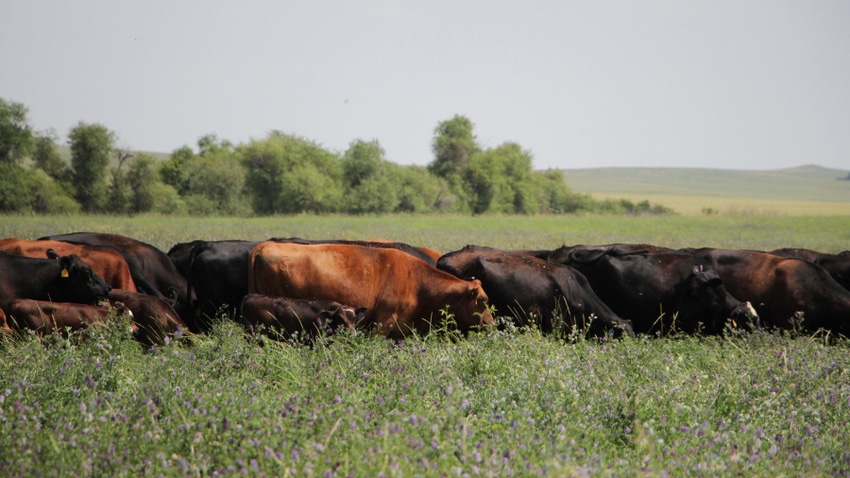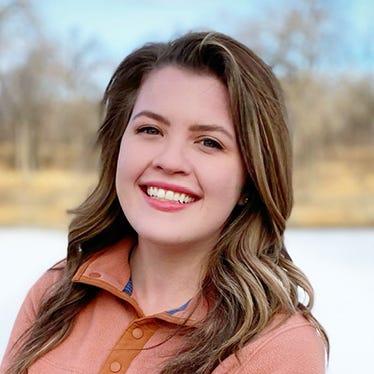
For producers who are beginning their ranch journey, or longtime ranchers who are considering a new management style, connecting with a mentor for guidance could make the difference between success or failure. For this purpose, North Dakota Grazing Lands Coalition and South Dakota Grassland Coalition both offer extensive mentor networks.
“We started our mentor network back in 1996 as a grassroots group to promote health and sustainability of grazing lands in North Dakota,” says Trish Feiring, NDGLC field representative, rancher and mentor. “This developed into a group of farmers and ranchers who are willing to share both their successes and failures with others, to help someone getting started or who might be struggling with their management.”
Feiring ranches alongside her husband, Donnie, and their daughters, Harley and Taylor, near Beach. Their ranch markets 100% forage-developed Black Angus, running on dryland pasture and native range in the rolling hills of western North Dakota. The breeding program at Feiring Cattle Co. is geared toward commercial cattle producers, selected for calm temperaments, fleshing ability, fertility, soundness, and a proper balance of milk and growth.
Mentors like Feiring can be found across the state, ranging from Bowman to Grafton and everywhere in-between. “We try to make sure they’re spread across the state as much as possible,” Feiring says. “We have 34 mentors right now, and we usually gain more each year.”
“It’s really great to see so many people here volunteering as mentors,” says Dan Rassmussen, SDGLC mentor and rancher in Belvidere. “If this network would’ve been around 30 or 35 years ago when I was moving to season-long grazing to more managed grazing while changing the culture of my ranch, I would’ve been calling folks up and down this list.”
Rassmussen ranches in and alongside the Badlands of South Dakota, just an hour from Badlands National Park. The family runs angus pairs and yearlings, while management focuses on leaving grass after grazing, providing ample rest and recovery in each pasture.
Topics for assistance
Both Dakotas have a full array of topics and mentors to choose from. For the northern state, Feiring says a lot of calls come in regarding winter grazing. “We have producers who call that want someone to take a look at a new system or something they’re building on their ranch with them, and also a lot of bale grazing and winter grazing strategy questions especially this time of year,” she explains.
A total of18 topics of expertise can be found in North Dakota, ranging from goal setting, fencing, water development, grazing of irrigated pasture, cover crops, and energy development’s impact on grazing.
Feiring herself is listed as an expert mentor for eight of these topics. “I get to play dual roles in my position with the coalition,” she says. “A lot of calls I get are ranchers wanting to find the right mentor for them, or those wanting to connect with our conservation partners.”
In South Dakota, 26 topics have expert mentors, building on similar topics from North Dakota. These include rotational grazing with sheep, diversifying with hunting or recreation, drought planning, prescribed burning, grazing management for expired Conservation Reserve program acres, low-stress livestock handling, and economics of grazing management.
Rasmussen is a mentor for 19 of these topics. “I’m one of the managers of the ranch consulting program,” he explains. “So I dabble in a lot of these different areas at some point, and I do get calls on different topics every year.”
Priority on education
“Our organization puts on grazing schools and pasture walks, workshops, and a whole long list of education opportunities,” Rassmussen says. “The big opportunity for education comes through mentoring, networking and learning from the people leading workshops, who are all mentors with us.”
With 2024 full of planned workshops, he says that there is something for everyone and everywhere. “We have grazing schools coming up in the summer — West River in June, one on the Missouri River in September, and August there will be one in the Summit-Marvin area. Those are all three-day schools,” Rasmussen explains. “Once you go through a grazing school, you can be enrolled in the follow-up ranch consulting programs.”
Education is king for North Dakota as well, with a set of holistic management videos on YouTube and Facebook. “These videos are all based off of the topics in our mentor network,” Feiring explains. “We originally planned to do 10 to 15 videos, and ended up doing 40, so that project really blew up.”
These videos cover grazing to fencing to succession planning and everything in between. “This time of year, it gives people the opportunity to sit down and watch those videos,” she says. The videos are being converted into podcast episodes for even more options to learn.
While membership could stand to grow after the COVID-19 pandemic, Feiring says this mentor network meets one of their main organizational goals: “Just like everyone else, it’s a struggle to get people coming back to in-person events. This network helps us achieve our education goal and to be a resource to people, while continuing to grow our membership.”
In North Dakota, producers can find a mentor at North Dakota Grazing Lands Coalition Mentor Network. In South Dakota, producers can seek expertise at South Dakota Grassland Coalition Mentor Network.
About the Author(s)
You May Also Like






